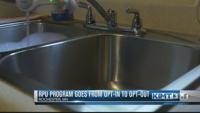KIMT News 3 - April is “Second Chance Month” in Minnesota. An initiative aimed at supporting the one in six children impacted by parental incarceration.
The Minnesota Department of Health and the University of Minnesota have been teaming up every April for the past few years.
The partnership has more than doubled the number of counties offering a program to keep imprisoned parents and their kids in touch.
The program is called the “Minnesota Model Jail Practices, Learning Community Project,” and it focuses on improving the health of children and their incarcerated parents by facilitating visits and completing parenting education programs in and outside of jail.
“A parent’s incarceration can often cause a ‘domino effect’ for kids – they may have to move homes, change schools, be separated from siblings,” said Dr. Rebecca Shlafer, associate professor at the University of Minnesota, Department of Pediatrics. “They benefit from having support to address their complex experiences and emotions when a parent goes to prison or jail.”
In addition, the program brings together local jails and community partners to learn best practices, share resources and work to reduce the negative effects of parental incarceration on children and families in their counties.
“A lot of people in our jails are moms, dads,” said James Stuart, executive director of the Minnesota Sheriff’s Association. “It’s important for us to understand that when a family member goes to jail, the whole family serves time. When we take these steps for parents, and children to stay connected, it can impact re-entry, recidivism and, most importantly, it can impact that child throughout their entire life.”
Researchers at the University of Minnesota found in 2017 that about two-thirds of adults in Minnesota jails were parents with children younger than age 18. Most of these parents lived with at least one of their children before arrest, and a majority were interested in parenting education.
The model jail practices learning community pilot project began in 2019, thanks to an initial grant from the Department of Justice, Office of Juvenile Justice and Delinquency Prevention Second Chance Act. Participating jails have made significant improvements during the last three years, despite launching the program during the COVID-19 pandemic.
Toolkits, presentations, courses and details about individual jail efforts from the first three years of the project are available on the MDH website.














